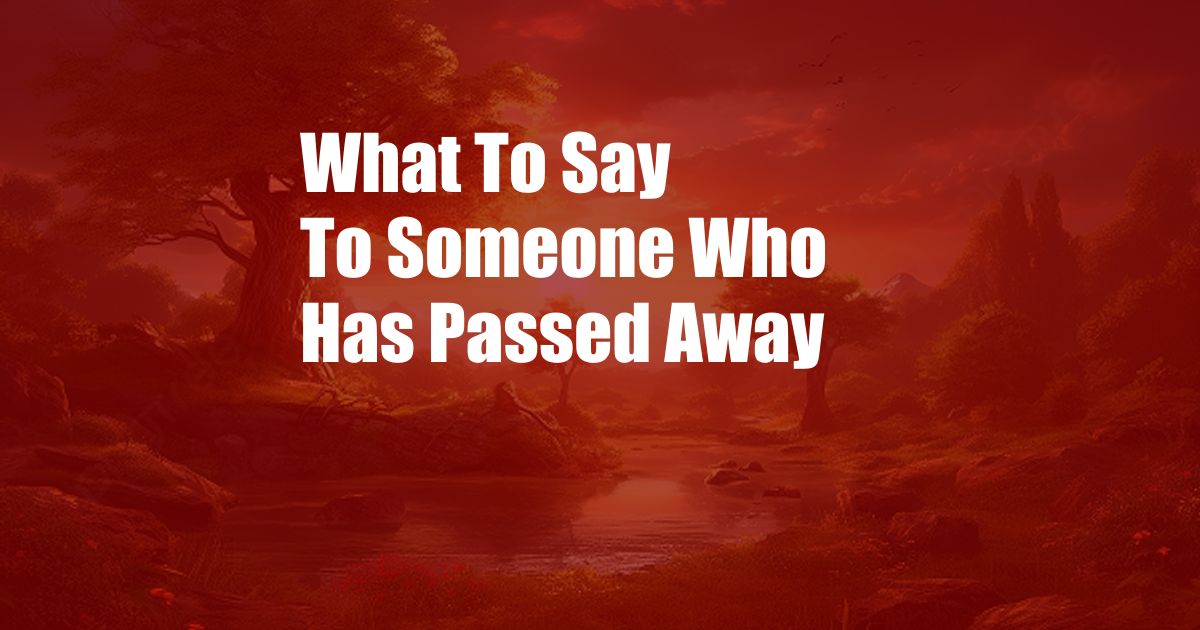
What to Say to Someone Who Has Passed Away
Death is a difficult experience, and it can be hard to know what to say to someone who has lost a loved one. The right words can provide comfort and support, but the wrong words can cause more pain. Here are some tips on what to say and what to avoid:
What to Say
-
Acknowledge the loss.
The first step is to acknowledge the loss. Let the person know that you know they are grieving and that you are there for them. You can say something like, “I’m so sorry for your loss” or “I can’t imagine what you must be going through.”
-
Offer your condolences.
Once you have acknowledged the loss, you can offer your condolences. This can be as simple as saying, “I’m so sorry” or “My deepest condolences.” You can also say something more personal, such as, “I remember how much you loved your grandmother. She was a wonderful woman.”
-
Share your memories.
If you have any memories of the person who died, you can share them with the grieving person. This can help them to feel connected to their loved one and to remember the good times they had together.
-
Offer your support.
Let the grieving person know that you are there for them and that you will support them in any way you can. You can say something like, “Please let me know if there is anything I can do” or “I’m here for you whenever you need me.”
-
Be patient. grief is a process.
It takes time to grieve a loss. Be patient with the grieving person and allow them to grieve at their own pace. Don’t expect them to be over the loss quickly.
What to Avoid
-
Don’t say anything dismissive.
Don’t try to dismiss the grieving person’s feelings. Don’t say things like, “I know how you feel” or “You’ll get over it in time.” These statements are not helpful and can make the grieving person feel worse.
-
Don’t offer platitudes.
Platitudes are empty phrases that don’t provide any real comfort. Avoid saying things like, “Everything happens for a reason” or “God never gives us more than we can handle.” These statements can be hurtful and dismissive.
-
Don’t try to fix the problem.
Grief is not a problem that can be fixed. Don’t try to offer solutions or advice. Instead, just listen to the grieving person and let them express their feelings.
-
Don’t avoid the grieving person.
It can be tempting to avoid a grieving person because you don’t know what to say or do. However, it is important to be there for them during this difficult time. Let them know that you care and that you are there to support them.
Expert Advice
-
Be present.
The most important thing you can do for a grieving person is to be present. Listen to them, offer your support, and let them know that you care.
-
Be patient.
Grief takes time. Don’t expect the grieving person to be over the loss quickly. Be patient and allow them to grieve at their own pace.
-
Don’t be afraid to talk about the person who died.
It can be helpful for the grieving person to talk about the person who died. Don’t be afraid to bring up their name or to share your memories of them.
-
Offer practical help.
In addition to emotional support, you can also offer practical help to the grieving person. This could include things like running errands, cooking meals, or taking care of children.
-
Respect the grieving person’s wishes.
Everyone grieves differently. Respect the grieving person’s wishes and don’t try to force them to do anything they don’t want to do.
FAQ
-
What should I do if I don’t know what to say?
If you don’t know what to say, the best thing you can do is to listen. Let the grieving person express their feelings and offer your support.
-
What should I do if the grieving person is angry?
It is normal for grieving people to experience anger. Be patient and understanding, and let them express their anger. Don’t try to argue with them or tell them how they should feel.
-
What should I do if the grieving person is withdrawn?
If the grieving person is withdrawn, respect their wishes and give them some space. Let them know that you are there for them if they need you.
-
What should I do if the grieving person is suicidal?
If you are concerned that the grieving person is suicidal, reach out for help immediately. Contact a crisis hotline or mental health professional.
Conclusion
Losing a loved one is a difficult experience, and it can be hard to know what to say to someone who is grieving. The most important thing is to be present, to offer your support, and to respect the grieving person’s wishes. By following these tips, you can help the grieving person to heal and to cope with their loss.
Are you interested in learning more about grief and loss? If so, please visit the following resources: